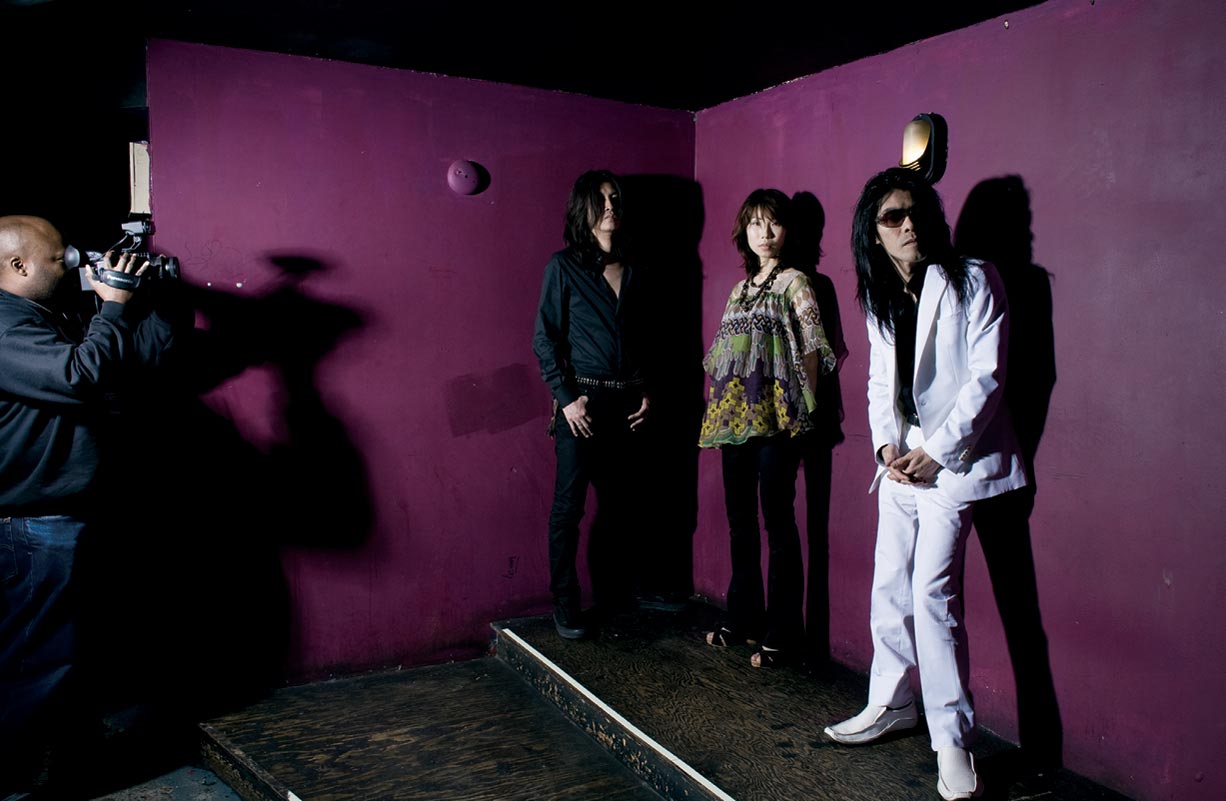Even from behind the most impenetrable of language barriers, there are certain sounds the human animal makes that are impossible to lose in translation. One such sound is the stunted, high-pitched intake of breath as the neurological system registers a profound shock. It is this sound that resounds over the phone after I mention to Boris bassist/rhythm guitarist, Takeshi, that their album Pink was declared one of the best albums of 2006 by several major American media outlets. “I didn’t know,” he laughs. “They need to tell me these things. I had no idea!”
It is tempting to chalk up this oversight to cultural disconnect (the three-piece hails from Japan), but a more apt diagnosis would be that for Boris, record sales and critical accolades are inconsequential compared to the experiences that making music has provided them and the joy of a synergistic working relationship with one another. Takeshi is quick to point out, in a somewhat Zen kind of way, that even the music itself has become a byproduct of something larger and more encompassing between he and his cohorts.
“When we first started playing, it was about making music, but the more we played the less it became about making music at all,” he says. “It was about working together and what came out of it ‒‒ the joy of living, the joy of meeting people, and the experiences that it has brought me. By not making music, I found real meaning.”
Defiant of convention, immune to pigeonholing, and predicated on experimentation, Boris (whose moniker was derived from the first song on Melvins‘ Bullhead) firmly established itself as one of the heaviest and most compelling doom-metal acts to emerge in the ’90s with Absolutego, a rumbling, interminable 65-minute onslaught. The album used thick, down-tuned chords sustained for achingly long durations that rivaled Sleep’s Jerusalem in terms of sheer might. The follow-up, 1998’s Amplifier Worship, found the group dabbling in slightly more traditional song structures, driving power riffs, and psychedelic sludgery (an approach they would revisit on 2003’s Akuma No Uta). After Amplifier Worship, 2000’s Flood submerged listeners in slow-building drones that coalesce into a veritable deluge of howling guitars and textural distortions.
Along with their many albums, there have been a slew of projects with artists such as Merzbow, Keiji Haino, and Ghost’s Michio Kurihara (notably on 2007’s triumphant Rainbows on Drag City). Two years ago they released Altar, a 2006 collaboration with Southern Lord labelmates Sunn O))).
“Three or four years ago we played with Sunn O))) in London, and thought it would be great to do a collaboration together,” says Takeshi. “Because we had become friends, it was a lot of fun, but in terms of the music that came out of it, it felt divine. It was music that had to be made, and when we did, it was like a release.” According to drummer/vocalist Atsuo Mizuno, “Altar was a document of Boris and Sunn O)))’s ten-year relationship.”
The most ambitious and most comprehensive of the Boris albums at the time of its release, 2005’s Pink was a rollicking patchwork of songs, showcasing melodic yet bottom-heavy hooks and low-frequency attacks that owed more to Blue Cheer, Motorhead, and Mudhoney than to Earth or Sleep. Despite the variances between each of their albums, there has always been an undeniable, singular philosophy of sound that permeates all of Boris’ music, even if the vocabulary used to articulate that philosophy is different from record to record. “There is something that is Boris in each of the albums,” says Takeshi. “But really, each time we make a new album, the goal is to get away from that.”
The dirty, stripped-down yet texturally and tonally rich sound that defines Boris comes from a combination of classic equipment and sheer imagination. The band members use only Gibson guitars and record only on analog equipment but utilize numerous effects pedals and rely heavily on experimentation. “We love buying old equipment,” explains Takeshi. “It’s really an adventure in what we can find in crazy stores and then playing on that. It’s all improvisation. Each time it’s, ‘What are the new toys that we found, what can we play with, what sounds can we make, and what comes out of that jam session?’ When we get tired of the sound coming out of the improvisation, we might just stop and be like, ‘All right, what’s the coolest riff that we can think of right now?’”
“We experiment with different settings on our equipment and often screw up,” Atsuo confides. “But even during those moments when we feel like we’ve made a mistake, if we just listen to the sound with new ears, we can discover great potential for all sorts of new sounds. We place equal importance on songwriting and creating the right sound.” If one fosters a good relationship with the world, communication becomes a much more enjoyable experience, according to Atsuo.

